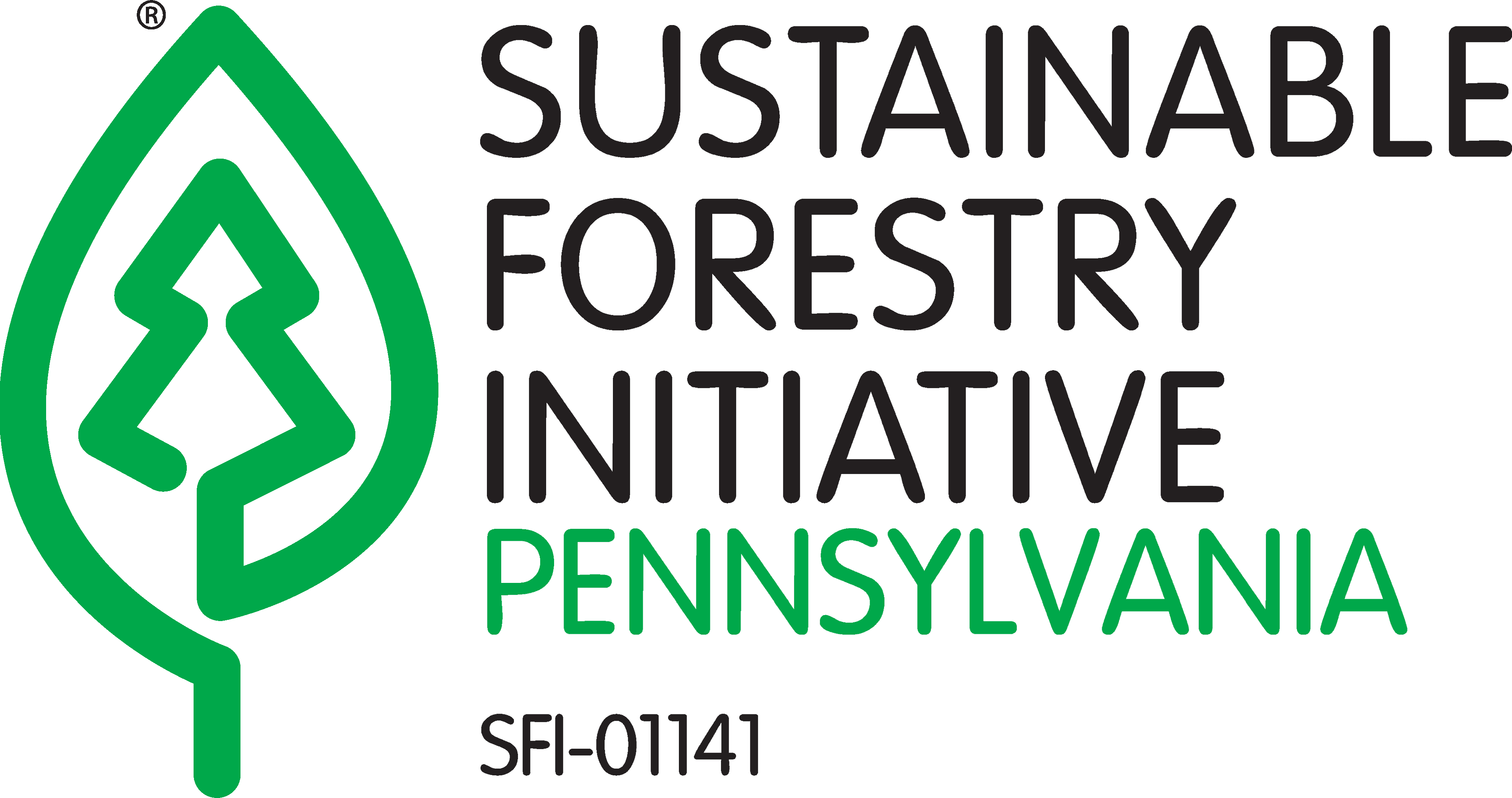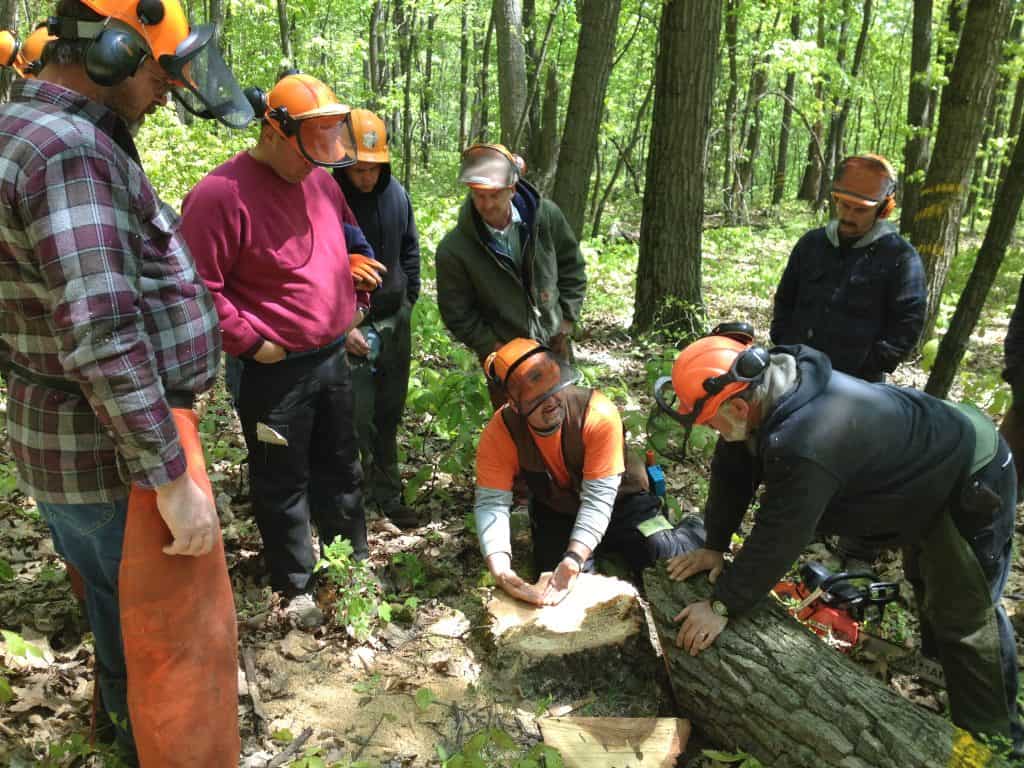
PENNSYLVANIA SFI PROFESSIONAL TIMBER HARVESTER TRAINING PROGRAM
Logger education programs have been a fundamental component of the SFI certification system since its inception in 1995. The Pennsylvania SFI Implementation Committee has provided high quality training to professional loggers operating in Pennsylvania for more than 30 years.
The mission of the Pennsylvania SFI Professional Timber Harvester Training Program is to provide an educational training system that promotes sustainable forest management, operational safety, skill improvement, and profitability to meet the needs of the timber industry in Pennsylvania, Pennsylvania forest landowners, and Sustainable Forestry Initiative, Inc.
To be recognized as a SFI Qualified Logging Professional (SFI QLP) through the Pennsylvania SFI Professional Timber Harvester Training Program, an individual must complete two core courses and provide proof of current First Aid and CPR certification within a 24-month period. Core training takes three days to complete, after which you need to attend four hours of continuing education training each year to maintain a current SFI QLP status. All training participants will receive an updated copy of their training record after each course they complete. Please refer to the Training Program Policy for complete details on training requirements
CORE TRAINING REQUIREMENTS
The following Core Level courses are required in order to be considered a SFI Qualified Logging Professional (SFI QLP) through the Pennsylvania SFI Professional Timber Harvester Training Program. Core training includes a basic set of courses designed to include everyone involved in timber harvesting activities. They may be taken in any order, but must be completed within a 24-month period.
(8-credit hours) Covers general safety considerations, chainsaw safety, logging equipment safety (harvesters, loaders, skidders, etc.), trucking safety and Occupational Safety and Health Administration (OSHA) Standards that apply to timber harvesting and related activities. Also covers pertinent aspects of Pennsylvania’s Clean Streams laws and other water resource protection regulations, Best Management Practices (BMPs), hazardous material control, and logging aesthetics. Professional Timber Harvesting Essentials can be taken for continuing education credit if you have not already completed the training in the last 5 years.
(8-credit hours) Introduces participants to open face felling, bore cutting, and the 5-step felling plan using a hands on approach. The course covers personal protective equipment, chainsaw safety features and reactive forces, proper chain filing techniques, and understanding important hinge wood properties and strength. This course is approximately 8 hours in length and is conducted outdoors. Class sizes are limited to provide participants one-on-one interaction with the instructor. Participants must provide their own safety equipment. Game of Logging – Level 1 can be taken for continuing education credit if you have not already completed the training in the last 5 years.
(4-credit hours) Because timber harvesting is a hazardous occupation, federal law (OSHA Regulations) requires that everyone who works in the woods maintain current First Aid & CPR (both) training from a provider who can issue a certificate or a card as documentation of hands on training (i.e. no online certifications will be accepted). Individuals do not need to complete this training through the PA SFI Professional Timber Harvester Training Program; however, they must provide proof of First Aid & CPR certification to satisfy this core training requirement (we cannot accept the MSHA 5000-23 form as satisfaction of this requirement). Training certificates can be submitted to the Pennsylvania SIC office via email, mail, or fax. First Aid & CPR training is not accepted for continuing education credit.
CONTINUING EDUCATION REQUIREMENTS
The PA SFI Professional Timber Harvester Training Program requires continuing education (CE) beyond the core courses to maintain a current status as a SFI Qualified Logging Professional (SFI QLP) and to continue professional development. Please refer to the Training Program policy for complete details on CE training requirements.
- After completing the core training, a minimum of 4 hours of CE must be completed each calendar year to keep an individual’s SFI QLP status current.
- If an individual’s SFI QLP status has expired within the last 5 years they can take CE training to bring it up to date (4 hrs/year). Individuals with a SFI QLP status expired beyond 5 years from the current calendar year are required to retake the core training.
- A person can accumulate additional CE credit to extend their SFI QLP status validation into the future, but only to a maximum of three years (12 hours) beyond the current calendar year.
- CE courses may not be repeated for credit within a 5-year period.
- A database showing each participant’s training ID#, name, city, county, state, SFI QLP expiration date, total training hours, and a summary of courses completed is available on our website. Individuals who do not wish to appear on the website must contact the PA SIC office.
- Training courses being offered outside the Pennsylvania SFI Implementation Committee can be considered for CE credit – see below.
ADDITIONAL TRAINING OPPORTUNITIES
Additional training opportunities are available through numerous organizations across Pennsylvania and in adjoining states. Training courses taken from other sources may qualify for training credit through the PA SFI Professional Timber Harvester Training Program, provided the subject of the course is relevant to the SFI program requirements, similar in content, and if some legitimate form of documentation is provided to the PA SIC office for proof of attendance. To submit Non-PA SFI training credits please fill out a copy of the Non-PA SFI Course Credit Form and send it to the PA SIC office with all necessary paperwork and fees. Refer to the Training Program Policy for complete details on training requirements.
NOTE: The Pennsylvania SFI Professional Timber Harvester Training Program does not audit the work of those who participate in the program and therefore does not “certify” individuals who maintain a current training status. The PA SIC does not endorse the work of individual loggers or businesses but verifies that they have met the training standards described in the Training Program Policy. Participants should refer to themselves as “SFI Trained/Qualified” and avoid representing themselves as being “certified” through the program. For additional details on “Trained/Qualified” versus “Certified” Logging Professional programs refer to Section 7, Objective 13 & Section 14 of the SFI Program Standard.


